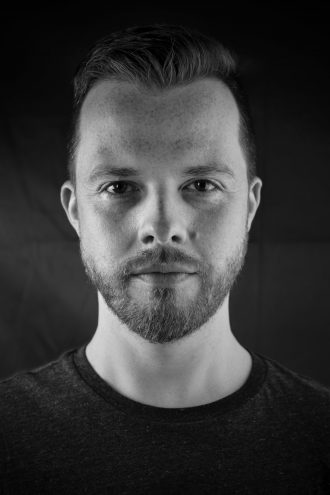Best British – Clothes & Blow
The Iris Blogger talks to writer-director Sam Peter Jackson
Clothes & Blow is the seventh short film from writer and director Sam Peter Jackson. It’s a comedy about an American voice artist living and working in London, balancing work, hook-ups and a surprise visit from his mother. The Iris Blogger caught up with Sam to ask him a little about the film.
IRIS BLOGGER: The lead character, Daniel, is a voice artist. You've done a bit of voice work yourself. Is
Clothes & Blow autobiographical? Did any career experiences find their way into the script?
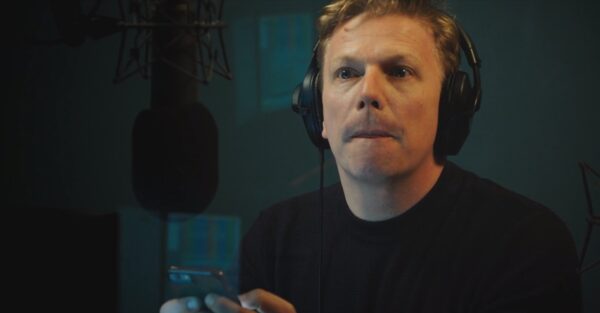 SAM PETER JACKSON:
SAM PETER JACKSON: Both me and our lead actor David Menkin work a lot as voiceover artists, so the studio scenes are definitely fed by real experience and the absurdities you can encounter in that industry. The story itself is not particularly autobiographical, I took the biggest inspiration from the three lead actors. David is one of my closest friends, he was in a Tom Hanks movie with Christy Meyer
(A Hologram for the King), and Nancy Baldwin and I used to do corporate training work together. I just always thought the three of them would play a family really well, so the ideas originated from there. I love writing for specific actors, especially if you can utilise some of the untapped resources in their talent. David, for example, plays a lot of very slick, in-control characters, so I got a real kick out of writing something for him that showed more of his vulnerable side.
IB: You've also written for theatre. Once you'd had the idea for
Clothes & Blow, did you ever consider writing it for the stage, or was it always going to be a film? How does writing for film differ from writing for theatre?
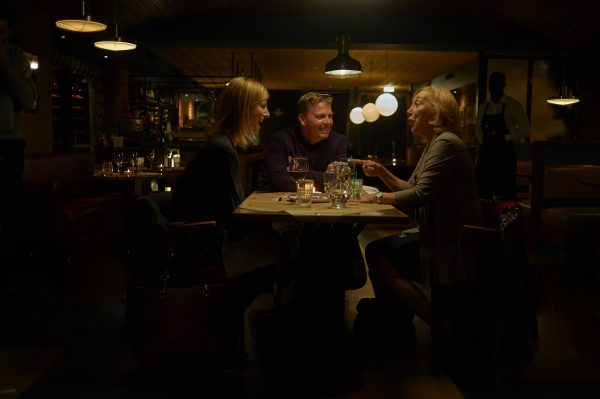 SPJ:
SPJ: Clothes & Blow was always conceived as a film, as I really wanted to make a short that was bigger in scope than my previous films, i.e. something that was more visually ambitious, used a multitude of different locations, etc. But I’ve often started projects thinking they would be for one medium and then ended up adapting them for another. I enjoy writing very playful dialogue, so if I get too carried away with that and stuck in one location, I either have to get the knife out or admit that it’s probably better as a play. I recently worked as a MoCap Performance Director for an animated VR short called LUCID, which is premiering at the Venice Film Festival over the summer. That was a really interesting hybrid. For a VR film it’s mostly about capturing a full scene in one perfect take, so you rehearse and perform it like a play, put the end result together like a film, but don’t need to worry about getting coverage, close-ups etc.
IB: The story is centred around family life and dating, and could easily have been written and played as a straight drama. Was that ever a consideration, or did you realise right away that it had to be a comedy?
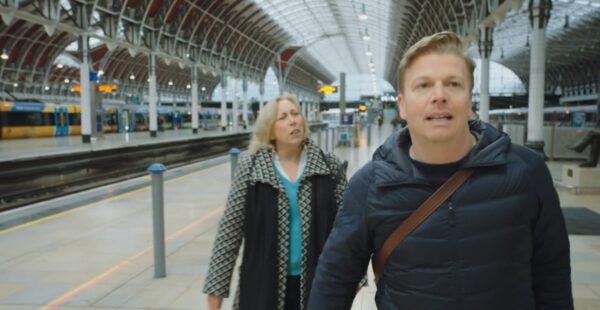 SPJ:
SPJ: Most of my work is comedy or at least has a comedic element to it. I think I gravitate towards comedy as a tool to make sense of the world, in my personal life too. Mixing comedy into a dramatic story creates a certain realism that I really like and it’s a way to paint with light and shade, like you see with directors like Scorsese or Tarantino. Comedy can offset a lot of heaviness and give you a more balanced result. Also I feel very passionately about bringing back a more truthful kind of comedy. A lot of big commercial comedies now betray their characters’ truth in favour of a big gag and it’s just about getting them from one big set piece to another. At the same time a lot of indie comedies can be too tonally whimsical. Films that tell an emotionally truthful story, but will genuinely make you laugh out loud are pretty rare these days. So that’s what I’m looking to create.
IB: After seven short films, you see yourself working on a feature?
SPJ: I’m writing one at the moment, and I have two passion project short scripts ready to go if I can get them financed. I have a slightly conflicting relationship with it all. I curse the writing process all the time. It’s a tedious, gut-wrenching, hair-pulling, bang-my-head-against-the-wall type experience for me, like hard turbulence in a small propeller plane during a lightning storm. But once it’s done I tend to be happy with the result. Directing by comparison is a pure joy, even on a very stressful day on set or when stuff goes wrong. I love the feeling of ideas on a page being turned into reality, that they will exist in the world as a story. The dilemma I have is that it’s most fulfilling when it’s my own script, when I’m expressing something that feels completely authentic and personal. So the writer and director inside me kind of hold each other hostage and I put myself through the pain to get to the pleasure.
IB: And lastly... your father co-wrote the song
Blame It on the Boogie. We've had famous films called
Moonlight and
Sunshine. Any plans to complete the tetralogy with
Good Times and
Boogie?
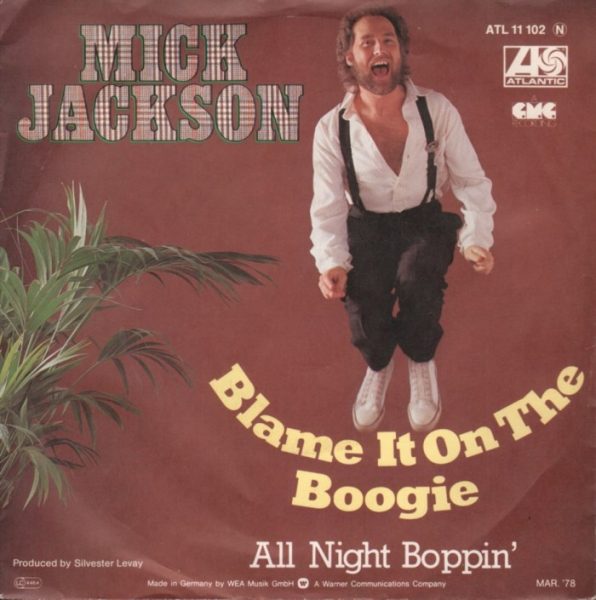 SPJ:
SPJ: Wow, you deep google-stalked me! Isn’t there a film called
Good Time with Robert Pattinson? And can we use
Boogie Nights maybe? I know, it’ll screw up the song. But yes, my Dad and my uncle wrote it, it’s our family’s big claim to fame. It’s a fascinating story actually. My Dad was the original artist of the song and he is also called Michael Jackson, although he recorded as Mick Jackson. Through various circumstances both his and the Jacksons’ version came out at the same time and it became a bit of an event, the press called it "The Battle of the Boogie". So him and MJ ended up in the charts at the same time, on the same edition of
Top of the Pops, staying in the same hotel and bumping into each other in an elevator. You couldn’t make it up! A filmmaker called Patrick Nation made a doc about it for Channel 4 a while ago (
The Other Michael Jackson), which I narrated and co-wrote, as the song came out in the year I was born.
 SAM PETER JACKSON: Both me and our lead actor David Menkin work a lot as voiceover artists, so the studio scenes are definitely fed by real experience and the absurdities you can encounter in that industry. The story itself is not particularly autobiographical, I took the biggest inspiration from the three lead actors. David is one of my closest friends, he was in a Tom Hanks movie with Christy Meyer (A Hologram for the King), and Nancy Baldwin and I used to do corporate training work together. I just always thought the three of them would play a family really well, so the ideas originated from there. I love writing for specific actors, especially if you can utilise some of the untapped resources in their talent. David, for example, plays a lot of very slick, in-control characters, so I got a real kick out of writing something for him that showed more of his vulnerable side.
IB: You've also written for theatre. Once you'd had the idea for Clothes & Blow, did you ever consider writing it for the stage, or was it always going to be a film? How does writing for film differ from writing for theatre?
SAM PETER JACKSON: Both me and our lead actor David Menkin work a lot as voiceover artists, so the studio scenes are definitely fed by real experience and the absurdities you can encounter in that industry. The story itself is not particularly autobiographical, I took the biggest inspiration from the three lead actors. David is one of my closest friends, he was in a Tom Hanks movie with Christy Meyer (A Hologram for the King), and Nancy Baldwin and I used to do corporate training work together. I just always thought the three of them would play a family really well, so the ideas originated from there. I love writing for specific actors, especially if you can utilise some of the untapped resources in their talent. David, for example, plays a lot of very slick, in-control characters, so I got a real kick out of writing something for him that showed more of his vulnerable side.
IB: You've also written for theatre. Once you'd had the idea for Clothes & Blow, did you ever consider writing it for the stage, or was it always going to be a film? How does writing for film differ from writing for theatre?
 SPJ: Clothes & Blow was always conceived as a film, as I really wanted to make a short that was bigger in scope than my previous films, i.e. something that was more visually ambitious, used a multitude of different locations, etc. But I’ve often started projects thinking they would be for one medium and then ended up adapting them for another. I enjoy writing very playful dialogue, so if I get too carried away with that and stuck in one location, I either have to get the knife out or admit that it’s probably better as a play. I recently worked as a MoCap Performance Director for an animated VR short called LUCID, which is premiering at the Venice Film Festival over the summer. That was a really interesting hybrid. For a VR film it’s mostly about capturing a full scene in one perfect take, so you rehearse and perform it like a play, put the end result together like a film, but don’t need to worry about getting coverage, close-ups etc.
IB: The story is centred around family life and dating, and could easily have been written and played as a straight drama. Was that ever a consideration, or did you realise right away that it had to be a comedy?
SPJ: Clothes & Blow was always conceived as a film, as I really wanted to make a short that was bigger in scope than my previous films, i.e. something that was more visually ambitious, used a multitude of different locations, etc. But I’ve often started projects thinking they would be for one medium and then ended up adapting them for another. I enjoy writing very playful dialogue, so if I get too carried away with that and stuck in one location, I either have to get the knife out or admit that it’s probably better as a play. I recently worked as a MoCap Performance Director for an animated VR short called LUCID, which is premiering at the Venice Film Festival over the summer. That was a really interesting hybrid. For a VR film it’s mostly about capturing a full scene in one perfect take, so you rehearse and perform it like a play, put the end result together like a film, but don’t need to worry about getting coverage, close-ups etc.
IB: The story is centred around family life and dating, and could easily have been written and played as a straight drama. Was that ever a consideration, or did you realise right away that it had to be a comedy?
 SPJ: Most of my work is comedy or at least has a comedic element to it. I think I gravitate towards comedy as a tool to make sense of the world, in my personal life too. Mixing comedy into a dramatic story creates a certain realism that I really like and it’s a way to paint with light and shade, like you see with directors like Scorsese or Tarantino. Comedy can offset a lot of heaviness and give you a more balanced result. Also I feel very passionately about bringing back a more truthful kind of comedy. A lot of big commercial comedies now betray their characters’ truth in favour of a big gag and it’s just about getting them from one big set piece to another. At the same time a lot of indie comedies can be too tonally whimsical. Films that tell an emotionally truthful story, but will genuinely make you laugh out loud are pretty rare these days. So that’s what I’m looking to create.
IB: After seven short films, you see yourself working on a feature?
SPJ: I’m writing one at the moment, and I have two passion project short scripts ready to go if I can get them financed. I have a slightly conflicting relationship with it all. I curse the writing process all the time. It’s a tedious, gut-wrenching, hair-pulling, bang-my-head-against-the-wall type experience for me, like hard turbulence in a small propeller plane during a lightning storm. But once it’s done I tend to be happy with the result. Directing by comparison is a pure joy, even on a very stressful day on set or when stuff goes wrong. I love the feeling of ideas on a page being turned into reality, that they will exist in the world as a story. The dilemma I have is that it’s most fulfilling when it’s my own script, when I’m expressing something that feels completely authentic and personal. So the writer and director inside me kind of hold each other hostage and I put myself through the pain to get to the pleasure.
IB: And lastly... your father co-wrote the song Blame It on the Boogie. We've had famous films called Moonlight and Sunshine. Any plans to complete the tetralogy with Good Times and Boogie?
SPJ: Most of my work is comedy or at least has a comedic element to it. I think I gravitate towards comedy as a tool to make sense of the world, in my personal life too. Mixing comedy into a dramatic story creates a certain realism that I really like and it’s a way to paint with light and shade, like you see with directors like Scorsese or Tarantino. Comedy can offset a lot of heaviness and give you a more balanced result. Also I feel very passionately about bringing back a more truthful kind of comedy. A lot of big commercial comedies now betray their characters’ truth in favour of a big gag and it’s just about getting them from one big set piece to another. At the same time a lot of indie comedies can be too tonally whimsical. Films that tell an emotionally truthful story, but will genuinely make you laugh out loud are pretty rare these days. So that’s what I’m looking to create.
IB: After seven short films, you see yourself working on a feature?
SPJ: I’m writing one at the moment, and I have two passion project short scripts ready to go if I can get them financed. I have a slightly conflicting relationship with it all. I curse the writing process all the time. It’s a tedious, gut-wrenching, hair-pulling, bang-my-head-against-the-wall type experience for me, like hard turbulence in a small propeller plane during a lightning storm. But once it’s done I tend to be happy with the result. Directing by comparison is a pure joy, even on a very stressful day on set or when stuff goes wrong. I love the feeling of ideas on a page being turned into reality, that they will exist in the world as a story. The dilemma I have is that it’s most fulfilling when it’s my own script, when I’m expressing something that feels completely authentic and personal. So the writer and director inside me kind of hold each other hostage and I put myself through the pain to get to the pleasure.
IB: And lastly... your father co-wrote the song Blame It on the Boogie. We've had famous films called Moonlight and Sunshine. Any plans to complete the tetralogy with Good Times and Boogie?
 SPJ: Wow, you deep google-stalked me! Isn’t there a film called Good Time with Robert Pattinson? And can we use Boogie Nights maybe? I know, it’ll screw up the song. But yes, my Dad and my uncle wrote it, it’s our family’s big claim to fame. It’s a fascinating story actually. My Dad was the original artist of the song and he is also called Michael Jackson, although he recorded as Mick Jackson. Through various circumstances both his and the Jacksons’ version came out at the same time and it became a bit of an event, the press called it "The Battle of the Boogie". So him and MJ ended up in the charts at the same time, on the same edition of Top of the Pops, staying in the same hotel and bumping into each other in an elevator. You couldn’t make it up! A filmmaker called Patrick Nation made a doc about it for Channel 4 a while ago (The Other Michael Jackson), which I narrated and co-wrote, as the song came out in the year I was born.
SPJ: Wow, you deep google-stalked me! Isn’t there a film called Good Time with Robert Pattinson? And can we use Boogie Nights maybe? I know, it’ll screw up the song. But yes, my Dad and my uncle wrote it, it’s our family’s big claim to fame. It’s a fascinating story actually. My Dad was the original artist of the song and he is also called Michael Jackson, although he recorded as Mick Jackson. Through various circumstances both his and the Jacksons’ version came out at the same time and it became a bit of an event, the press called it "The Battle of the Boogie". So him and MJ ended up in the charts at the same time, on the same edition of Top of the Pops, staying in the same hotel and bumping into each other in an elevator. You couldn’t make it up! A filmmaker called Patrick Nation made a doc about it for Channel 4 a while ago (The Other Michael Jackson), which I narrated and co-wrote, as the song came out in the year I was born. 